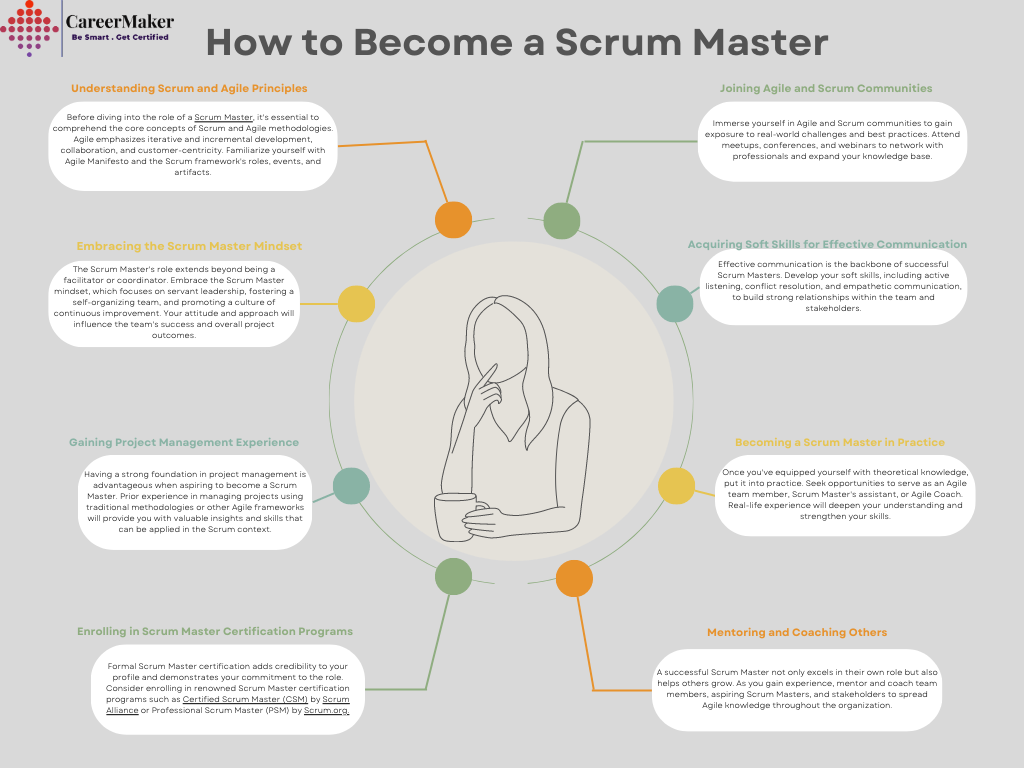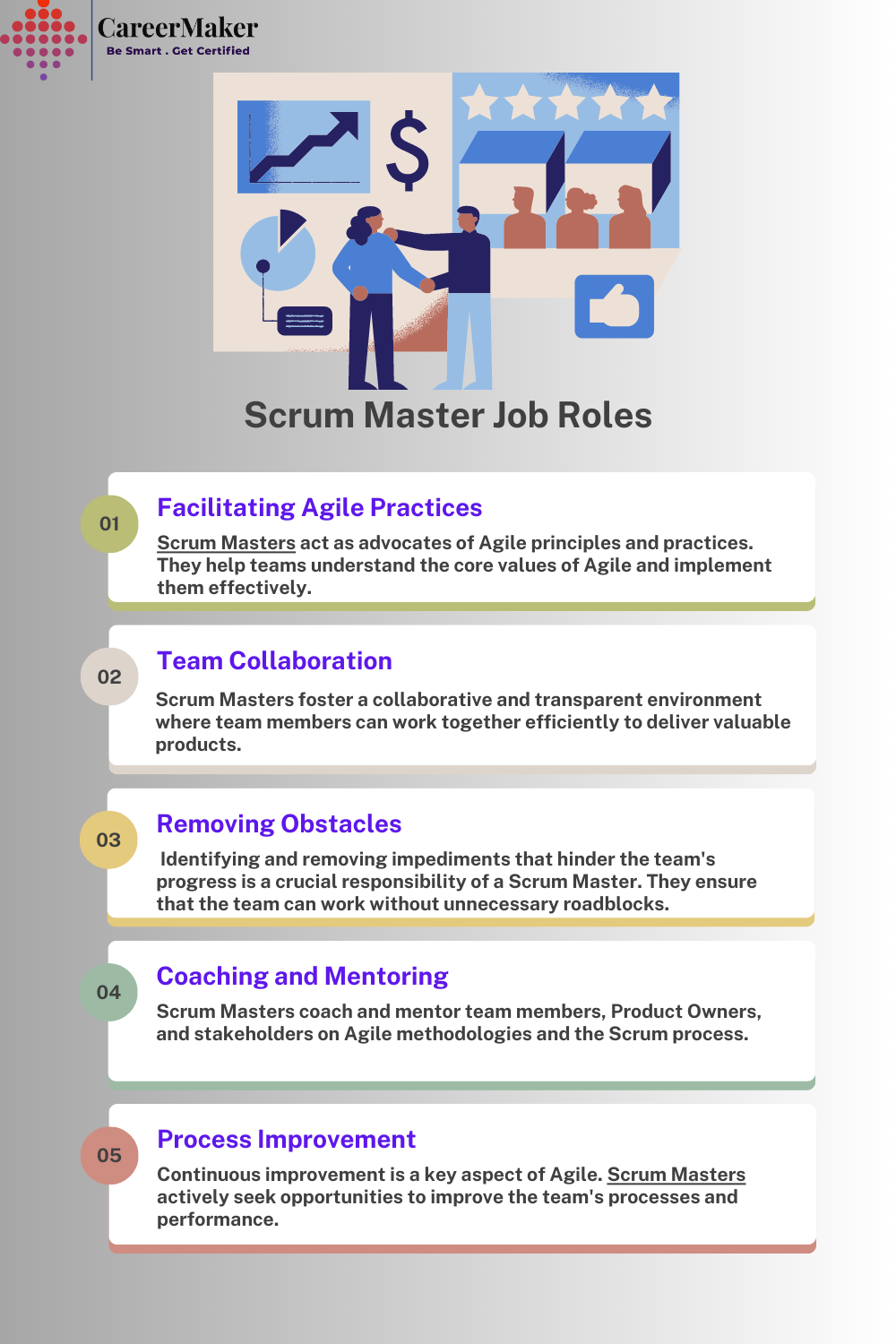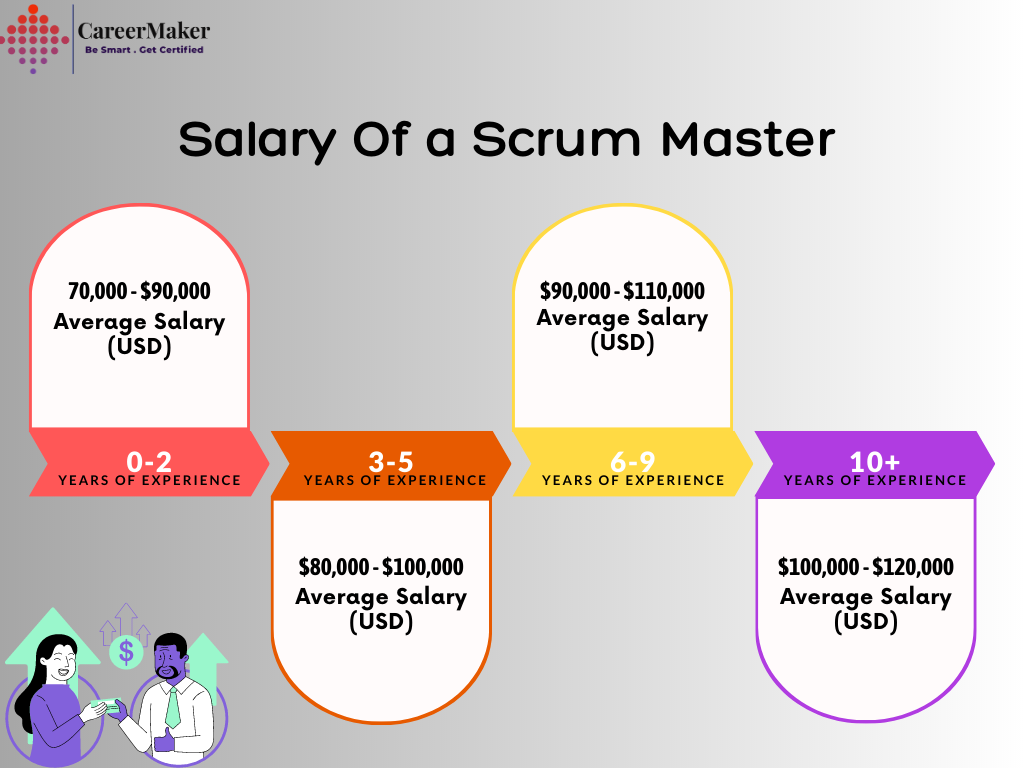How to Become a Scrum Master: Step By Step Complete Details
Introduction
Welcome to the ultimate guide on how to become a Scrum Master. In today’s fast-paced and dynamic business world, organizations are adopting Agile methodologies to enhance productivity and deliver high-quality products and services. As Agile gains popularity, Scrum Masters are in high demand due to their pivotal role in implementing and fostering Agile practices within teams.
This article is your one-stop resource to understanding what it takes to become a successful Scrum Master. Whether you are an aspiring project manager, a team leader, or a professional looking to switch careers, mastering Scrum will empower you with the knowledge and expertise to lead Agile projects effectively.
How to Become a Scrum Master

Becoming a Scrum Master involves a multifaceted journey that combines skill development, hands-on experience, and an understanding of Agile principles. Here’s a step-by-step guide to help you navigate your way toward becoming a proficient Scrum Master:
1.Understanding Scrum and Agile Principles
Before diving into the role of a Scrum Master, it’s essential to comprehend the core concepts of Scrum and Agile methodologies. Agile emphasizes iterative and incremental development, collaboration, and customer-centricity. Familiarize yourself with Agile Manifesto and the Scrum framework’s roles, events, and artifacts.
2.Embracing the Scrum Master Mindset
The Scrum Master’s role extends beyond being a facilitator or coordinator. Embrace the Scrum Master mindset, which focuses on servant leadership, fostering a self-organizing team, and promoting a culture of continuous improvement. Your attitude and approach will influence the team’s success and overall project outcomes.
3.Gaining Project Management Experience
Having a strong foundation in project management is advantageous when aspiring to become a Scrum Master. Prior experience in managing projects using traditional methodologies or other Agile frameworks will provide you with valuable insights and skills that can be applied in the Scrum context.
4.Enrolling in Scrum Master Certification Programs
Formal Scrum Master certification adds credibility to your profile and demonstrates your commitment to the role. Consider enrolling in renowned Scrum Master certification programs such as Certified Scrum Master (CSM) by Scrum Alliance or Professional Scrum Master (PSM) by Scrum.org.
5.Joining Agile and Scrum Communities
Immerse yourself in Agile and Scrum communities to gain exposure to real-world challenges and best practices. Attend meetups, conferences, and webinars to network with professionals and expand your knowledge base.
6.Acquiring Soft Skills for Effective Communication
Effective communication is the backbone of successful Scrum Masters. Develop your soft skills, including active listening, conflict resolution, and empathetic communication, to build strong relationships within the team and stakeholders.
7.Becoming a Scrum Master in Practice
Once you’ve equipped yourself with theoretical knowledge, put it into practice. Seek opportunities to serve as an Agile team member, Scrum Master’s assistant, or Agile Coach. Real-life experience will deepen your understanding and strengthen your skills.
8.Continuously Learning and Adapting
Agile practices evolve, and so should you. Stay updated with the latest trends, methodologies, and tools related to Agile and Scrum. Invest in continuous learning and professional development to remain a competent Scrum Master.
9.Mentoring and Coaching Others
A successful Scrum Master not only excels in their own role but also helps others grow. As you gain experience, mentor and coach team members, aspiring Scrum Masters, and stakeholders to spread Agile knowledge throughout the organization.
Also Read: https://careermaker.us/how-to-become-a-scrum-master-with-no-experience/
Scrum Master Job Roles

Scrum Masters play a pivotal role in facilitating the adoption of Agile practices within teams and organizations. They are responsible for guiding teams through the Scrum framework and ensuring that the team follows Agile principles to achieve project success. Some key job roles of a Scrum Master include:
- Facilitating Agile Practices: Scrum Masters act as advocates of Agile principles and practices. They help teams understand the core values of Agile and implement them effectively.
- Team Collaboration: Scrum Masters foster a collaborative and transparent environment where team members can work together efficiently to deliver valuable products.
- Removing Obstacles: Identifying and removing impediments that hinder the team’s progress is a crucial responsibility of a Scrum Master. They ensure that the team can work without unnecessary roadblocks.
- Coaching and Mentoring: Scrum Masters coach and mentor team members, Product Owners, and stakeholders on Agile methodologies and the Scrum process.
- Process Improvement: Continuous improvement is a key aspect of Agile. Scrum Masters actively seek opportunities to improve the team’s processes and performance.
Scrum Master Job Responsibility
The job role of a Scrum Master goes beyond just managing a team. They act as servant-leaders, promoting a culture of self-organization, open communication, and continuous learning. Here are some critical aspects of the Scrum Master’s role:
1.Leading the Scrum Team
Scrum Masters lead the Scrum Team, which typically consists of developers, testers, and other professionals working together on a project. They guide the team to achieve their highest potential and ensure that they adhere to the Scrum framework.
2.Facilitating Scrum Events
Scrum events, such as Sprint Planning, Daily Stand-ups, Sprint Review, and Sprint Retrospectives, are essential components of the Scrum process. The Scrum Master facilitates these events, ensuring they are productive and time-boxed.
3.Shielding the Team
A Scrum Master shields the team from external distractions and influences, allowing them to focus on delivering high-quality work during each Sprint.
4.Collaborating with Product Owners
Scrum Masters work closely with Product Owners to understand the product vision and prioritize the backlog items. They ensure that the Product Owner’s requirements are clear and feasible for the development team.
What Does a Scrum Mater Do?
The responsibilities of a Scrum Master are diverse and challenging, requiring a combination of technical and interpersonal skills. Some key responsibilities include:
1.Implementing Agile Principles
Scrum Masters are responsible for implementing Agile principles across the organization. They guide teams in Agile adoption and help establish a culture of Agile mindset and practices.
2.Facilitating Team Dynamics
Creating a healthy and collaborative team dynamic is crucial for a successful Scrum implementation. Scrum Masters foster an environment of trust, transparency, and open communication within the team.
3.Resolving Conflicts
In any team, conflicts may arise. Scrum Masters play a pivotal role in resolving conflicts and facilitating effective communication among team members.
4.Monitoring Progress
Scrum Masters closely monitor the team’s progress during each Sprint and ensure that the team stays on track to achieve Sprint goals.
5.Continuous Improvement
Promoting a culture of continuous improvement is a key responsibility of a Scrum Master. They encourage the team to reflect on their performance and identify areas for improvement.
Skills Required to be a Successful Scrum Master
Becoming a Scrum Master requires a unique set of skills and experiences. While there are no strict prerequisites, having the following qualities can significantly enhance one’s suitability for the role:
1.Strong Understanding of Agile Principles
A deep understanding of Agile principles and methodologies is essential for any Scrum Master. Knowledge of Agile frameworks like Scrum, Kanban, or Lean is highly beneficial.
2.Excellent Communication Skills
Effective communication is at the core of a Scrum Master’s role. They must be adept at conveying ideas, facilitating discussions, and actively listening to team members.
3.Leadership and Servant-Leader Attitude
Scrum Masters are servant-leaders who focus on the needs of the team and support them in achieving their goals. Leadership skills and a positive attitude are vital for success in this role.
4.Problem-Solving Abilities
Scrum Masters often face complex challenges. Being a good problem solver allows them to find creative solutions to impediments that may arise during the project.
5.Adaptability and Flexibility
Agile environments are dynamic, and requirements may change rapidly. Scrum Masters must be adaptable and flexible to respond effectively to changing circumstances.
Difference Between Scrum Master vs Project Managers
| Aspect | Scrum Master | Project Manager |
|---|---|---|
| Role Focus | Facilitates Agile Development | Manages Projects |
| Methodology | Primarily Agile (Scrum) | Various (Agile, Waterfall, etc.) |
| Responsibility | Facilitates Scrum Principles | Ensures Project Success |
| Team Facilitation | Leads Scrum Ceremonies | Coordinates Team Activities |
| Impediment Removal | Focuses on Team Efficiency | Addresses Project Obstacles |
| Management Authority | No Direct Team Management | Directly Manages Project Team |
| Project Scope | Limited to Scrum Framework | Encompasses Entire Project Lifecycle |
| Planning & Scheduling | Collaborates on Sprint Planning | Develops Detailed Project Plans |
| Risk Management | Limited to Scrum Implementation | Manages Risks Throughout the Project |
| Documentation | Minimal Formal Documentation | Extensive Project Documentation |
| Stakeholder Management | Collaborates with Stakeholders | Engages and Manages Stakeholders |
| Decision-Making | Facilitates Team Decision-Making | Makes Final Project Decisions |
| Flexibility | Emphasizes Adaptability | Balances Flexibility and Structure |
| Continuous Improvement | Encourages Iterative Improvement | Focuses on Lessons Learned |
Also Read:https://careermaker.us/difference-between-scrum-master-vs-project-manager/
Best Certifications for Scrum Masters
While certification is not a mandatory requirement for becoming a Scrum Master, it can add credibility to your profile and showcase your commitment to the role. The two most recognized certification for Scrum Masters are
- Certified Scrum Master (CSM):
- Cost: The cost of the Certified Scrum Master (CSM) certification may vary depending on the training provider and location. On average, the certification cost ranges from $800 to $1200 USD.
- Exam Format: Unlike many other certifications, the CSM does not have a separate exam. Instead, it requires attending a 2-days CSM training course conducted by a Certified Scrum Trainer (CST). During the training, participants engage in interactive sessions, discussions, and practical exercises to learn about Scrum principles, roles, events, and artifacts.
- Passing Score: The passing score for the CSM exam is usually around 74%.
- Prerequisites: The CSM certification does not have formal prerequisites. Anyone interested in learning about Scrum can attend the CSM training, regardless of their prior experience or background.
- Professional Scrum Master (PSM1):
- Cost: The cost of the Professional Scrum Master (PSM) certification varies depending on the level of certification. The PSM I certification exam fee is approximately $150 USD.
- Exam Format: The PSM1 certification is provided by Scrum.org and requires passing an online exam. The PSM I exam consists of 80 multiple-choice questions, and candidates have 60 minutes to complete it. The questions assess the candidate’s knowledge of Scrum principles, practices, and their application in real-world scenarios.
- Passing Score: To obtain the PSM I certification, candidates need to achieve a minimum passing score of 85%. The exam is designed to assess a candidate’s comprehensive understanding of Scrum and its practical implementation.
- Prerequisites: The PSM I certification does not have formal prerequisites. However, it is recommended to have a basic understanding of Agile principles and Scrum before attempting the exam.
Conclusion
Congratulations! You have now learned the key steps to becoming a proficient Scrum Master. Remember, the journey to mastering Scrum is continuous, and you should always be open to learning and improving. Embrace the Scrum values, lead with a servant heart, and foster a collaborative work environment.
Becoming a Scrum Master empowers you to make a significant impact on projects, teams, and organizations. So, go ahead and embark on this exciting journey to shape the future of Agile project management.
FAQs About Becoming a Scrum Master
What qualifications do I need to become a Scrum Master?
To become a Scrum Master, formal qualifications are not mandatory but highly recommended. Consider obtaining Scrum Master certifications like CSM or PSM to enhance your marketability.
Can I become a Scrum Master without prior project management experience?
While prior project management experience is beneficial, it is not a strict requirement. Enthusiasm, adaptability, and a willingness to learn are equally crucial for success as a Scrum Master.
What is the average salary of a Scrum Master?
The salary of a Scrum Master varies based on factors such as experience, location, and the organization. On average, Scrum Masters can earn between $80,000 to $120,000 per year.
How can I transition from a traditional project manager to a Scrum Master?
Transitioning from a traditional project manager to a Scrum Master requires a shift in mindset and adapting to Agile principles. Seek Scrum Master certification and gain hands-on experience in Agile projects.
What are the common challenges faced by Scrum Masters?
Scrum Masters often encounter challenges such as resistance to change, communication issues, and maintaining team motivation. Developing strong problem-solving skills can help navigate these challenges effectively.
Is the role of a Scrum Master limited to the IT industry?
No, the role of a Scrum Master is not limited to the IT industry. Scrum can be applied across various domains, including marketing, finance, healthcare, and more.
Q: What is the typical career path for a Scrum Master? A: Scrum Masters can progress in their careers by gaining experience in handling larger and more complex projects. Some may choose to move into Agile coaching or take on leadership roles within the organization.
Q: Can a Scrum Master become a Product Owner? A: While it is possible for a Scrum Master to transition to the role of a Product Owner, they are distinct roles with different responsibilities. Scrum Masters focus on facilitating the team, while Product Owners concentrate on defining and prioritizing the product backlog.
Q: Is the role of a Scrum Master limited to the IT industry? A: No, the Scrum Master role is not limited to the IT industry. It is widely applicable in various fields and sectors that embrace Agile methodologies.
Q: How important is the Scrum Master in ensuring project success? A: The Scrum Master plays a crucial role in fostering a productive and collaborative environment for the team. Their guidance and facilitation are essential for ensuring the success of Agile projects.
Q: Can one person be the Scrum Master for multiple teams? A: In certain circumstances, a Scrum Master can work with multiple teams, especially if the teams are small or co-located. However, it’s essential to ensure that the Scrum Master can provide adequate support to each team
